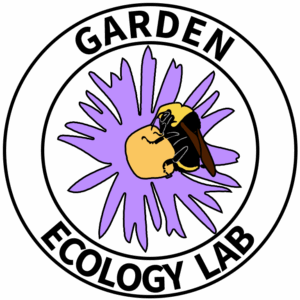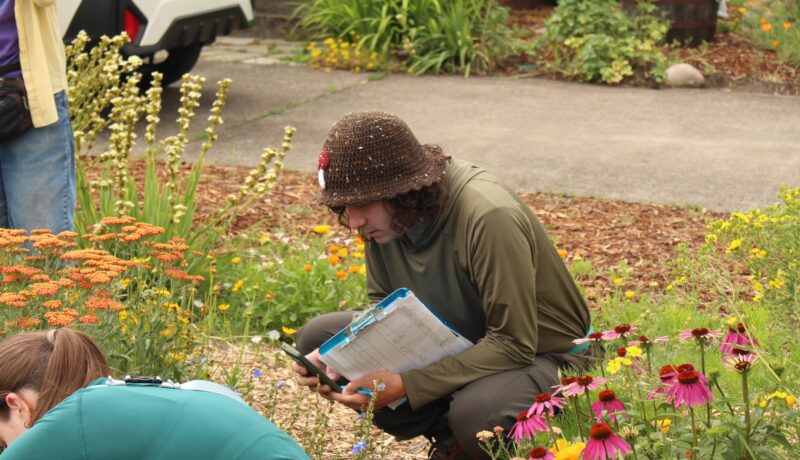Garden research takes a lot of time, patience, and money. For example, the four new research projects that I detailed in an earlier post will cost close to $180,000 *this year, alone* to cover the salary and benefits of one post-doctoral scientist, two graduate students, and three undergraduate student researchers. And that doesn’t cover the cost of materials or supplies, including the 200+ plants that we purchased for two of the studies! We currently cover the costs through a combination of a USDA Fellowship that supports Gwynne, cost-sharing with another research group to support Cara, small grant funds and donations made to our research fund managed by the Agricultural Research Foundation to support Jen and the undergraduate researchers.

Ask any scientist that serves as the Principle Investigator (PI’s) of a research group (such as the Garden Ecology Lab at OSU): the hardest part of doing science is ensuring that you have the funds to pay the people that are integral and essential parts of your team. It is the part of my job that I lose sleep over, most often.
This week, the Garden Ecology Lab and Oregon Extension Master Gardener Program received news that literally changes the future for research and Extension in gardens.
Clackamas County Master Gardener Sherry Sheng, and her husband Spike Wadsworth, made a gift of $503,000 to the Oregon State University Foundation, to formally establish the Y. Sherry Sheng and Spike Wadsworth Master Gardener Professorship Fund. This week’s donation creates a gift annuity of $503,000, where payouts will benefit the Professorship Fund. This gift is in addition to the $1.2 million planned estate gift that Sherry and Spike made to the Oregon State University Foundation in 2012. Both gifts will combine (when Sherry and Spike pass away), for a $1.7+ million endowment that will fully fund what I suspect is the very first Endowed Master Gardener Professorship in the United States.
The language describing the intent of the Professorship fund is below:
“The OSU Master Gardener™ Program offers engagement and outreach in communities across Oregon. OSU faculty train volunteers through in-person and online instructions and provide hands-on experience in advising home gardeners.
The personal contacts Master Gardener volunteers provide clients are rooted in the design of the Master Gardener Program: informed by science, accessible to the public, and delivered by trained volunteers in a cost-effective manner.
Quality and effectiveness of the program requires a strong leader in the position of the Statewide Master Gardener Coordinator and the leader’s ability to engage in scientific research. Nearly all of the gardening advice universities dispense to home gardeners are derived from agricultural research. This is because research funding concentrates in commercial crops while there is little to no money to support research in gardens. As a result, gardens are understudied.
The Y. Sherry Sheng and Spike Wadsworth Master Gardener Professorship Fund is intended to support the Master Gardener Program leader’s original research in gardening practices that build soil, conserve water, grow food for people and wildlife, and nurture the human spirit.

It is important to note that the Y Sherry Sheng and Spike Wadsworth Master Gardener Professorship is an estate gift, and will benefit the NEXT generation of garden researchers and Extension professionals. Even though the funds will not be realized for several decades, their contribution and pledge solidifies support for the Master Gardener Program in Oregon with key administrators and decision-makers, and helps to raise the overall profile of the Master Gardener Program.
In addition to Sherry and Spike’s current and planned estate gifts, the Master Gardener Coordinator’s position will also be supported by a planned estate gift from Bob and Barbara Bailey, both Master Gardeners in Wasco County. Once again, as an estate gift, these funds will benefit the next Statewide Master Gardener Program Coordinator, many years down the road.

Oregon’s Master Gardener Program also benefits from endowment funds that currently sit in an Oregon State University Foundation endowment account for the Statewide Master Gardener Program. This fund was established by the Oregon Master Gardener Association in 2004, in collaboration Jan McNeilan and Ray McNeilan. This endowment has since been funded by thousands of grassroots donations, ranging from $10 to $25,000, from individual Master Gardener volunteers, family, and friends, as well as from the Oregon Master Gardener Association and its 22 chapters. The fund currently generates about $10,000 per year, that is or has been used to pay for:
- the partial salary of the former Statewide Master Gardener Program Assistant,
- the partial salary of the current Statewide Master Gardener Program Outreach Coordinator
- bridge funding for Lane, Hood River, Union, and Marion County Master Gardener Programs, when they experienced funding shortfalls,
- the Statewide Master Gardener Program Leader’s travel to teach local Master Gardener classes in 27 counties across the state,
- creation and maintenace of tools to support Master Gardener volunteerism, including the Volunteer Reporting System, Solve Pest Problems, and the soon-to-be released Plant Clinic Database (known as ECCo, for Extension Client Contact Database).
With all sources of support combined, Oregon’s Master Gardener Program will eventually be supported by the income generated from over $2.5 million in endowed funds. Once again, it is important to note that many of these gifts will not be realized for decades (so I hope, because I genuinely care for the donors!). But when I think about what it will mean for the MG Program in Oregon, it’s a mind-boggling and landscape changing level of support. OSU is going to be the home to the best-resourced Master Gardener Program in the nation, and the support offered by the Y Sherry Sheng and Spike Wadsworth Master Gardener Professorship not only raises the profile of the Master Gardener Program ~ but will attract a unique and highly qualified pool of applicants who are the best leaders, educators, and scientists in the world.

Master Gardener programs in some states often struggle with funding issues. Some states have no statewide program leader, which hampers efforts for coordinated programming, among other things. I don’t know of another Master Gardener Program that maintains a Principle Investigator lab group, such as the Garden Ecology Lab at OSU. Although some Programs engage in research, I don’t know of any that consistently conducts field-based, original research that results in peer-refereed journal publications that are the gold standard for research-based recommendations.
The support that our garden research and Extension programs have received has been a essential to what we have been working to build in the OSU Garden Ecology Lab. Our research on native plants, garden pollinators, garden soils would have never happened without this support.
Moving into the future, the establishment of the first named Professorship for the Master Gardener Program in Oregon is game-changing, and will surely place OSU’s Master Gardener Program among the leaders in home and community gardening research and Extension.
To all of those folks who are currently conducting research in home or community garden systems, no matter where you are . . . keep an eye on OSU. In the future, OSU will be able to offer an irresistable package of support to help you build a world-class research and Extension program focused on gardens.




3 Comments
Add Yours →thanks for sharing
Most impressive, and a tribute to your work so far. Congratulations.
First, thank you. As an MG in Lane County, I look for all the insight I can find. I’m a retired teacher(Spanish). I’ve been gardening all my life. I continue to supervise our school garden(Oak Hill School in Eugene) and care for my own.
For several years I’ve been trying to figure out how to offer some sort of “class”. There’s an activity period twice a week, but it just doesn’t work. Not enough time nor continuity. After reading your article I had the following FLASH: meet 4-5 days/week after school and include a parent(s) who shows up anyway to pick up their child. Start with compost, which lends itself to being able to work with continuously. From there, we’re off and running(perhaps I should say “seeding”).
Anyway, those are my thoughts. Thank you again.